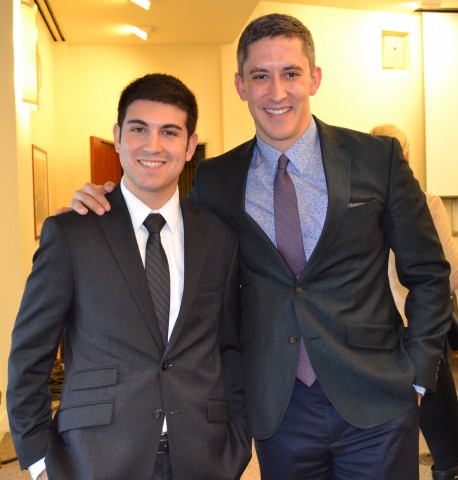Exclusive Interview: Rand Getlin of Yahoo! Sports Discusses the Value of a Law Degree in Sports Journalism
February 5, 2014
The legal and business landscape of the sports industry has shifted dramatically within the past few decades. Only a select few journalists in contemporary news media have taken it upon themselves to chronicle these changes and shine light on the darker side of sports.

One such journalist is Yahoo! Sports reporter and legal analyst Rand Getlin. Mr. Getlin attended University of Southern California Law School before opening his own consulting firm and eventually becoming an investigative reporter. On February 7th, he will take part in the inaugural Chapman Entertainment and Sports Law Symposium: Where Sports and the Law Collide. I was able to speak with Mr. Getlin before the event to discuss the value of a legal education in journalism and the future of sports.
You have a J.D. and work as a reporter and legal analyst for Yahoo! Sports. What made you decide to pursue this path and how did you get to where you are today?
I traveled a pretty unconventional route to get where I am at today. It’s something that I couldn’t define very cleanly, but a lot of it was just recognizing early that a legal education allows you to do so many things. I was told early on by some very successful business people that a J.D. is one of the few things you can use to do just about anything in life. While you can’t go on to be a doctor, there are very few restrictions on that you can do once you’ve obtained it. If you go to business school for instance, you can’t practice law. You also can’t be a doctor. There are a million things you can’t do with an MBA. But certainly with a JD you’ve got a lot of options.
I always had a very entrepreneurial streak and decided at one point based on a series of events in my professional career that I wanted to try my hand in being an investigative reporter. That’s where I started out with Yahoo! Sports. I got a chance for very little money to see if I could earn my stripes in the investigative realm. Three and a half years later, it’s turned into a full time profession for me. My role has expanded in large part due to my legal education. It helps me think about the world in a unique way.
How does your legal background affect the way you look at sports?
It’s absolutely essential to the way I analyze the space. One of the things you see immediately is there aren’t that many legal minds in the sports realm. Even though it is an incredibly sophisticated business in terms of the amount of money that’s generated and the size and scope of the industry, it is fairly unsophisticated in terms of the analysis of the space. The business of sports is still a very much a niche aspect of the industry. If you look at Sports Business Journal, it’s behind a paywall. If you look at things like Sports Law Blog, it’s very much an insider publication. Sports Agent Blog has had a lot of success with folks like us who are young and trying to break into this business.
I just have always felt that there’s so much room for people who think like lawyers to start looking at it in much more sophisticated way. What are the legal underpinnings of the APU movement (All Players United movement launched by former-Northwestern quarterback Kain Colter) and the Ed O’Bannon case? It’s become so complex that if you don’t have a legal background, what you’ll have is laypeople writing about complex legal issues and I think misinformation seeps out into the public. While a legal education doesn’t automatically render you a legal scholar in all realms and all places, it certainly assists you in thinking like a lawyer and knowing how to access the information. A legal education is not imperative to being a journalist, but it certainly has helped me immensely, and I can’t even imagine doing my job as effectively as I’m able to do it now without that legal education.
You’re a very active member of Twitter. How important is social media to a sports writer like yourself and how do you feel it’s changed the reporting of sports?
If it were not for Twitter, I would not have this job. I actually met the individual who helped me to get my original position through Twitter. He had noticed that I had been talking about some issues that the public wasn’t fully aware about. He asked me “how in the world did I know this stuff?” We got into a back and forth about how I came into possession of the information. From there, I really started working towards becoming a journalist.
I think social media has fundamentally changed the landscape of sports, and I don’t think the implications are fully understood yet. I said this yesterday on a radio show that I don’t think Northwestern happens in terms of the students attempting to unionize but for the advent of social media and the widespread dissemination of information. It’s so rapidly flowing out to the parties that be.
For instance, when Kain Colter and Northwestern players announced, “Hey, we’re attempting to form a union. We want to be deemed employees, and we want to start obtaining basic protections.” A player from the University of Georgia– a very popular running back with over 40,000 Twitter followers — says “I love what the Northwestern players are doing.” Well, presumably both of those individuals are being followed by other athletes who are impressionable and feel that they’re being taken advantage of and exploited. The extent to which the information flows is directly related to today’s social media whether it be Instagram, Twitter, Snapchat, you name it. And so there are all of these things out on the horizon that we’re not aware of yet — technology that has yet to be revealed to the public — that will continue to make the world smaller. The smaller the world becomes, the more people have access to information and the better educated they become. I think today’s legal environment for the NCAA being attacked on so many fronts can be contributed to the widespread dissemination of information based on the internet and social media.
On February 7, 2014 you will be speaking on a panel at Chapman University Fowler School of Law Sports Law Symposium to discuss professional responsibility within athlete representation. What has changed about athlete representation over the past two decades, and why might someone want to become a sports agent?
The money that has come into the business in the past few decades is staggering. If you look at basic line charts of the money that was available to players in 1980 compared to the money that’s available to players today, you’d be looking at hockey stick growth. It’s flat, flat, flat, until the advent of free agency and the explosion of television rights deals. The money now being thrown about to different players — $100 million deals in baseball, those kinds of things — certainly is the most fundamental change in my mind.
People that want to get into sports agency generally fit one of a few basic categories: those who want to make a ton of money and don’t understand that the business is not one that you can just jump into, and those that want to help kids even though the business is not particularly well-situated to allow you to do effectively.. There’s a ton of money floating around. However, as an agent in football, you get 3% of a deal which is much smaller today for rookies than it was three or four years ago. After you pay training expenses, marketing, media training, etc., often times these agents are operating at a loss on the first deal. Because it’s such a cutthroat industry, agents steal clients from other agents right before the second deal. Often times, agents lose large amounts of money invested on players betting on the outcome.
Overall, the business has become poisoned. There’s just so much money being thrown at these players in order to obtain their signatures. But the really savvy agents are the ones who don’t necessarily spend a lot of time recruiting rookies. They instead recruit veterans because the second contract is where the money’s at. So to answer the initial question of why someone would want to become a sports agent, I think you have to in some way shape or form be a bit crazy. You understand it is not necessarily the most rational space to enter, but you want to be in it anyway and you’re willing to take on the risk. It is not for the faint of heart.
A record amount of underclassmen declared for the 2014 NFL Draft, breaking the previous high mark set a year earlier. Why are so many college football players choosing to leave early, and do you expect this trend to continue?
Simply stated, they’re leaving for two primary reasons. One, they have more awareness than ever that they’re operating within a multi-billion dollar business and they are the only group of individuals who are being told that their income is going to be restricted and they shouldn’t complain about that. They see a lot of people eating off their plate while leaving them with scraps and telling them to appreciate that which they have. Their self-awareness is at an all-time high, and they’re not accepting those directives any longer. Two is the new NFL collective bargaining agreement has drastically reduced the amount of money available to rookies in all of the rounds but especially rounds two through seven. In the first round, coaches used to be able to say, “If you stay for another year, and you’re the number one overall pick, you’re going to get a $30-40 million signing bonus.” Today that number is much closer to $15 million. Ultimately, the incentive to stay in school and incur uncompensated risk for another year — risk of injury and losing all of your earning potential — does not outweigh the rewards of leaving for the NFL.
The agents are doing a particularly effective job of communicating the situation. If you get drafted at the bottom of round one, you’re locked into a four-year deal with a fifth-year team option and a sixth-year franchise tag possibility. If you get drafted in the fourth, it’s a four-year deal with no fifth-year option. Even if they franchise you, you’re locked into a shorter deal. They’re promoting that these kids get into the business as soon as humanly possible and start working towards a second contract so they can capitalize on the value they have in the market. Detractors will say that very few kids make it to a second contract. That’s correct, but at least they’re getting paid something. League minimum is in excess of $400,000, which for many of these kids and many of us is a lot of money. Their ability to access that money doesn’t last forever; football’s a particularly brutal sport. Go get it while you can, otherwise it might disappear forever.
As you mentioned, players on the Northwestern football team began the process of unionization led by former-Wildcat Kain Colter. How do you feel about the idea of collegiate athletes bargaining with the universities, and do you believe this has the potential to affect college sports on a national level?
I believe it is absolutely necessary. I applaud these young men for doing what they’re doing here, and I do believe that there is a real possibility that this will change the face of college athletics forever. Now, there are a lot of people that think it’s the end of college athletics as we know it. That may be true, but it won’t be the end of college athletics. There’s too much money here. They’re not going to kill the cash cow because the cow got a little bit skinnier now that you’re sharing money with the players. They’re just going to deal with it. There’s so much money flying around. Nick Saban is making $7.5 million a year. Is he going to stop working at the University of Alabama because the market has changed such that he’s only making $5 million a year or $4.5 million? If that’s what the market bears out, these coaches are going to coach in those places because there are only so many jobs available. If that’s a problem for these coaches, the boosters are going to have to determine how much they actually care about having Nick Saban at the helm.
I think these kids are forcing an issue that needed to be done, and it’s absolutely sent shock waves through the NCAA. If the kids at Northwestern are successful in forming a union, and those players are deemed to be employees as determined by the NLRB, then every private school including USC, Stanford, Syracuse, and others will be subject to that same determination. Those players would be able to join this new college athlete’s union as well. To that end, what these players are looking for
will expand into compensation at some point, as it should. I think it’s absolutely wonderful for the kids. I’m glad they are self-aware enough now to stand up, and I applaud their bravery. I hope it really does have an impact on college sports such that players start sharing in the tremendous value they create in the market.
We’d like to thank Mr. Getlin for taking the time to answer our questions
Be sure to visit
RandGetlin.com
where you can find his work from around the web. Also make sure to register for the upcoming Entertainment and Sports Law Symposium to see Mr. Getlin and other sports industry professionals discuss sports and the law by visiting the
Chapman Entertainment and Law Symposium’s website
.
_________________________________________________________________________
About the author:

Jason Hirschhorn (J.D. ’15) is in his second year at Chapman University Fowler School of Law. He received his B.A. in History from University of Illinois at Urabana-Champaign. He is the editor-in-chief at
Hook’em Headlines
and editor at
Acme Packing Company
. Follow Jason on Twitter
@JBHirschhorn
The views expressed in the student blogs are those of the author and not the law school.

